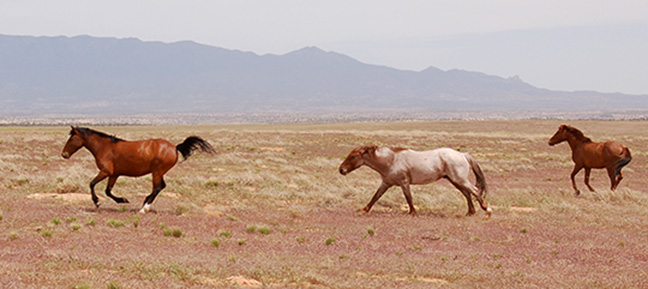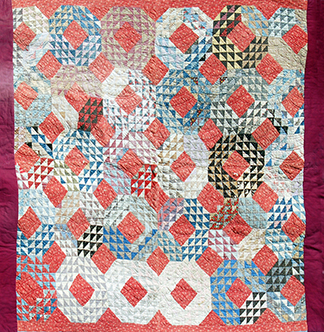
Wild horses still roam the plains of the Four Corners area, as they did in the 1880s.
Alice Magill's account of trip continues from previous page
On Sunday June 9th, we had to remain in our camp as the wind and wet ground prevented our moving on. We held "meeting" there for worship, as we were Christadelphians and we sincerely believe that we should not neglect our duty to God, under any circumstances.
On Monday, the weather being better, we started west again. Within a few days we reached the home of the Mrs. Lou Taylor, where we spent several days and had our "meeting" on the second Sunday of our trip. We found good fishing in Pecan Creek, before we traveled on.
One night we were disturbed by the horses becoming nervous. Indians had been known to harm travelers, not so long before that in that vicinity, so the men kept watch part of that night but the alarm turned out to be wolves nearby, which had discovered a thin antelope the men had left not far from camp. They had killed it that evening and found it unfit for our use.
Later in June, Mabel Magill took sick with Intermittent Fever, so we stopped in San Angelo and saw a doctor and got some medicine. We were detained by the sickness for eleven days. We then moved on to Colorado City, Texas, and struck camp a few miles out, where we remained until the fever had broken. Some of the group grew restless but all remained together and were very congenial and were all interested in each other’s welfare to a degree seldom experienced in these days of 1940.
We traveled northwest and were soon on the famous ‘Staked Plains’ of Texas, which we found to our surprise, were covered with green grass that our horses enjoyed. Also there were windmills and tanks and wells of water. Some water, especially lakes of that region, were tainted with alkali, but we found plenty of good fresh water to supply us without the necessity of hauling it in vessels as travelers a few years previous had been compelled to do.
Our group kept fairly well and enjoyed the trip. We saw no trees for some time. Then one day we came upon a flat, clear stream, called (‘Pijanita’ in Spanish) Dird Creek, with green cottonwood trees growing along the banks. We rested there at noon and all remained in good health. We had brought along plenty of medicines but needed very little during the eight weeks we traveled, before reaching Las Vegas New Mexico early in August. There we were joined by I.T. Banta and his wife, Nannie, and baby daughter, Kate (two years old). They had left Kerr County, Texas after we did but had not been hindered as we had and so had traveled faster. I.T. Banta was a brother of mine, Mrs. S.M. Magill.
While in Las Vegas, New Mexico, we sold most of our horses and wagons and left Mr. J.K. Magill and Mr. Jeffries to sell the remainder and travel on later. We continued on by train (Union Pacific), early in August. The first night on the train we were delayed by a washout on the line. Later, as we were leaving La Junta, Colorado, a man was run over by the train but was still alive when we left. He gave his name as John Kelley. He had both his arms and legs cut off by the train.
We continued on to Pocatella, Idaho where we transferred on to ‘narrow-gauge’ which took us on to Portland, Oregon. In Portland we enquired about work and were directed to La Camas, Washington. We had to remain in Portland until the next day to get the right boat, the ‘Multnomach,’ which was then in use on the Columbia River. From Portland we went on to La Camas, 30 miles up the river. At La Camas we found that there had been plenty of work in the lumber mills, but the rush was over. We remained there for three weeks, but having failed to find a location, we took the same boat back to Portland and took the train on to Tacoma, Washington.

